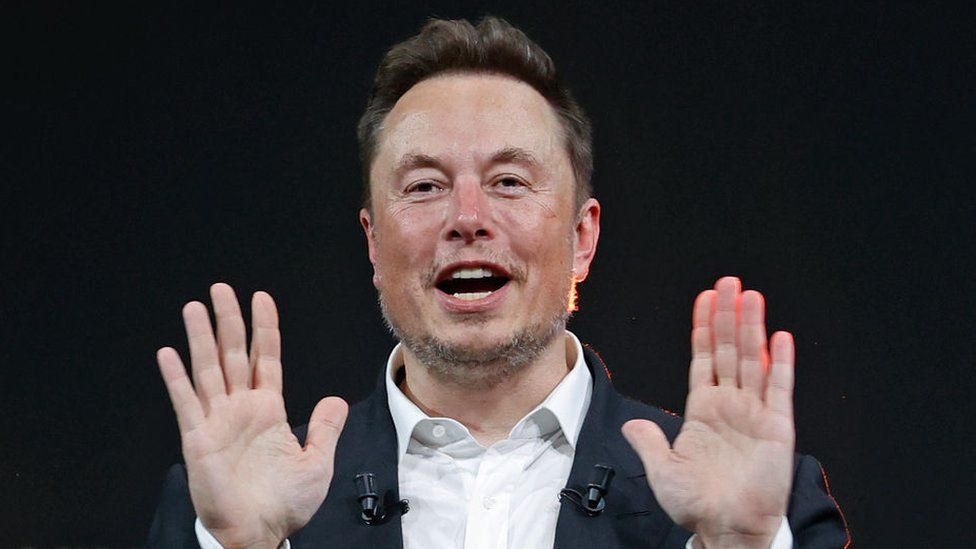ARTICLE AD BOX
 Image source, Reuters
Image source, Reuters
By Peter Hoskins & Fan Wang
BBC News
Earlier this week Elon Musk rebranded Twitter to X - another step in his plan to emulate Chinese mega app WeChat.
Mr Musk has long said that he wants to transform his social media firm, which he bought last year for $44bn (£34.4bn), into a much larger platform.
He has previously praised WeChat - a so-called "everything app" that combines chat, dating, payments and social media - and has said creating something "even close to that with Twitter... would be an immense success".
In a post on X this week, Mr Musk said that over the coming months, "we will add comprehensive communications and the ability to conduct your entire financial world".
He will hope that growing X will lead to a jump in revenue - the company has lost almost half its advertising revenue since Mr Musk bought it, and it is struggling under a heavy debt load.
So what is WeChat - and why does Mr Musk want to emulate it?
Launched by technology giant Tencent in 2011, WeChat is now used by almost all of China's 1.4bn people.
Calling it a super-app is an understatement.
Its services include messaging, voice and video calling, social media, food delivery, mobile payments, games, news and even dating.
It is like WhatsApp, Facebook, Apple Pay, Uber, Amazon, Tinder and a whole lot more rolled into one.
It is so woven into the fabric of Chinese society that it is almost impossible to live there without it.
As you can see from the images below, the interfaces for its various parts are distinct.
WeChat's shopping service (L), its food deliveries, hotel bookings, and cinema bookings (centre), and its investment page (R)
It started as a messaging platform like WhatsApp or iMessage, and its two most-used features are the WhatsApp-like "Chats" and "Moments", which is similar to Facebook.
Its widely-used "Wallet" feature can be linked to debit and credit cards - most shops and online retailers in China accept WeChat payments, with users scanning QR codes to pay. People can also pay household builds, make investments, and even take out loans on WeChat.
Government services are also on WeChat, with users able to check social security information, pay speeding tickets and book hospital appointments.
And during the pandemic, it became an essential: while the whole country was under strict zero-Covid restrictions, it was impossible to move around without a "health code" generated on the app.
But there are several downsides to having so many features on one app.
From a practical point of view, WeChat takes up a large part of a phone's memory - typically tens of gigabytes of data storage.
More seriously, the huge reach of WeChat into every corner of Chinese life has raised concerns about government censorship, surveillance and other privacy issues.
China blocks access to many foreign websites, from news outlets like the BBC to social media platforms such as Facebook and, ironically, Elon Musk's X.
This level of state control over the internet also makes it extremely dangerous for people to speak out against the government on WeChat.
It is not unusual for dissenting voices to have their accounts suspended for days or weeks for something they have said in Chats or on Moments.
Even people sharing seemingly uncontroversial information have found themselves on the wrong side of government censors and had their accounts and chat groups shut down.
Kitsch Liao, assistant director of the Atlantic Council's Global China Hub, says super-apps like WeChat align with Beijing's aims of organising all aspects of life to keep control of the country.
"Principally to prevent 'political risk' - anything that could germinate into an opposition and eventual risk to the CCP's [Chinese Communist Party's] rule."
Will it work in the West?
WeChat's huge success in China is down to two major factors, Kecheng Fang, at Chinese University of Hong Kong, tells the BBC.
For one, most people in China access WeChat on smartphones, rather than desktop computers, due to the relatively late development of the internet in the country.
"Which means they live in the walled gardens of apps rather than the open web. It is much easier to build an 'everything app' on smartphones than on computers," he says.
Mr Fang also says that China's lack of competition regulation - which contrasts with most Western countries - allows an app like WeChat to effectively block rival platforms, such as shopping platform Taobao and video app Douyin.
Could Mr Musk make a similar app work outside China? We may be finding out soon - and experts believe it may all depend on digital payments.
Kendra Schaefer, from policy research firm Trivium China, says that Mr Musk has already recognised some of the key elements that have helped make WeChat "critical to daily life" in China, including integrating social media with digital payments.
That could be the "secret sauce of the super-app", she says.
Edith Yeung, from investment firm Race Capital, points out that a major difference between China and the West is the widespread adoption of digital payment technology.
Most merchants in China do not accept cash or credit cards.
This difference, she says, may be an obstacle to Mr Musk's ambitions. "It will take the Western world longer to implement a truly cashless or credit card free society," she says.

 1 year ago
33
1 year ago
33








 English (US)
English (US)